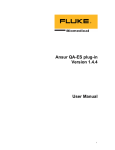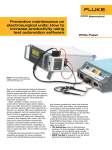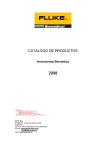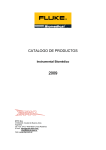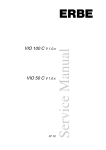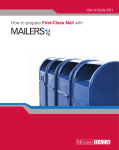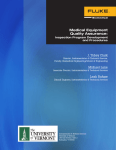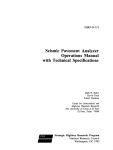Download White Paper
Transcript
White Paper Preventive maintenance on electrosurgical units: how to increase your productivity If you have ever performed preventive maintenance (PM) on an electrosurgical unit (ESU), you know it requires significant background and proper information to do so. In the past, opting for manufacturers’ contracts may have alleviated these concerns. When presented with a problem or failure, you would call for a technician visit or loaner unit. Your ESU was sent for maintenance and later returned repaired and/or fully inspected for a flat-rate cost. ESUs were considered dangerous equipment and regardless of contract cost, only the manufacturer would touch the device. Yearly maintenance contracts were typically proposed by manufacturers. Since that time, the safety of ESU devices has increased dramatically. During the same period, increased budget restrictions have required careful scrutiny and/or cancellation of expensive maintenance contracts. Most hospitals have purchased newer, safer ESU analyzers and initiated in-house preventive maintenance for those devices. You now send an ESU for repair only after confirmation of fault or defect. How does this system work for you today? Do you find preventive maintenance on ESU devices easy to perform? How long does it take for you to perform preventive maintenance on an ESU? Fluke Biomedical developed the Ansur-automated version of the QA-ES Electrosurgical Analyzer with simplification and productivity in mind. With this system, all measurements are performed and documented within 12 to 15 minutes. A customizable report (shown in Fig. 2) is automatically created at the end of the PM and can be exported in PDF format using any PDF creator software. Step by step test guide There are several advantages for a biomedical department to adopt an automation solution. Cumbersome PM procedures for devices with only periodic PM schedules are difficult to remember and necessitate a reliance on service manuals to remember step-by-step details related to the task. Each model has a different procedure, and sometimes one model has different procedures depending of its version. This is a wasteful system. Ansur test automation allows you to precisely define in a template every step to be performed. Pictures and diagrams can be added to these templates to help you visualize how to do the job, as shown in the example below. 6045 Cochran Rd, Cleveland, OH 44139 USA | Tel 440.248.9300 | Fax 440.349.2307 | Email: [email protected] | www.flukebiomedical.com White Paper Needed service manual information can be input into the Ansur template so bulky print manuals no longer need to be carried or stored nearby. Each template can be named for the exact model it refers to. Because Ansur templates are stored in a PC, there is no limit to the number of PM procedures you can automate. For teams that employ specialized technicians, automated procedures can allow non-specialized technicians with minimum training to successfully perform a PM with ease. These new technicians are guided step by step while the software minimizes risk of human error by applying pre-defined pass/fail criteria. 6045 Cochran Rd, Cleveland, OH 44139 USA | Tel 440.248.9300 | Fax 440.349.2307 | Email: [email protected] | www.flukebiomedical.com White Paper Fig. 2: report example obtained with an Ansur-automated QA-ES 6045 Cochran Rd, Cleveland, OH 44139 USA | Tel 440.248.9300 | Fax 440.349.2307 | Email: [email protected] | www.flukebiomedical.com White Paper Checklists are easy to create and perform as shown in the opposite view. Diagrams and pictures can be added. Additional columns such as “Not Applicable” can also be included and can be useful when, for example, an accessory is missing. The automation software automatically collects the test measurements and checks if they are within the specified limits. The limits can be set on power, current, voltage peak-to-peak, or crest factor. In this example, the limits are set to current. For power, limits can be set either in % of the nominal power or in absolute values (watts). If a QA-ES internal footswitch is used, the operator even doesn’t have to press the ESU footswitch. The QA-ES closes a relay when needed, which generates the HF signal and automatically collects the result and stops the generator. With one single click, the measurement is performed, collected, and documented. User-friendly Ansur test automation secures your work Click on “Next” to go to the next step or on “Start” again if, for example, you forgot to set the proper mode on the ESU because the phone rang in the middle of your test. The new measurement for this step will overwrite the previous erroneous one and, this time, the test will pass without having to restart the entire procedure from the beginning. 6045 Cochran Rd, Cleveland, OH 44139 USA | Tel 440.248.9300 | Fax 440.349.2307 | Email: [email protected] | www.flukebiomedical.com White Paper Testing the REM/ARM function When it comes to this important function, we recommend using a decade box. Ansur test automation can accurately describe and easily implement this test, as shown below. Power distribution curve You may sometimes need to perform a concentrated analysis of your ESU performance. A surgeon may complain about perceived performance differences of a unit, requiring you check if the manufacturer specifications are still fully met. This may also be very helpful when evaluating a new device prior to purchase. At these times, you will want to draw a power distribution curve showing what power is effectively generated as expected over an extended patient load selection. This data is required by standards (ANSI/AAMI/IEC 60601-2-2: 2006) for loads ranging from 100 Ω to 2000 Ω for all monopolar modes and is provided in the manufacturer’s service manual. Once the test template is created, Ansur test automation automatically captures a power distribution curve in approximately 20 seconds. 6045 Cochran Rd, Cleveland, OH 44139 USA | Tel 440.248.9300 | Fax 440.349.2307 | Email: [email protected] | www.flukebiomedical.com White Paper There are 128 load selections in the QA-ES, starting at 10 Ω, then from 25 Ω to 2500 Ω by 25 Ω increments and from 2500 Ω to 5200 Ω by 100 Ω increments. Going so high may seem unnecessary, but doing so corresponds to some reallife conditions. For example, when an organ is protected by a glucose solution the resistance becomes very high. You can include any one of these loads in a power distribution test in increasing or decreasing order. Power output vs. setting Another requirement from ANSI/AAMI/IEC 60601-2-2: 2006 is to show the power output versus the output control setting at a specified load, usually the nominal value for which the power reaches its maximum. Despite not being a usual requirement in the manufacturer’s preventive maintenance protocols, this is also easily achieved by the automated QAES. As this test requires an adjustment of the ESU power setting for each step, it takes longer than a power distribution test; but when using the QA-ES internal footswitch to control the ESU this is still very convenient. 6045 Cochran Rd, Cleveland, OH 44139 USA | Tel 440.248.9300 | Fax 440.349.2307 | Email: [email protected] | www.flukebiomedical.com White Paper Measuring high frequency leakage current Measuring high-frequency leakage current is probably standard in your test procedure. This is also conveniently performed with the Ansur-automated QA-ES. The ability to upload diagrams and customized written instructions allow test visualization and minimized dependence on training resources. The limits are freely set. For monopolar outputs, you would choose 100 mA, if not using the special table described in the standard. A lower limit is applicable for bipolar outputs (usually 50 mA to 70 mA) but the standard sets a formula based on the maximum power for a given bipolar mode. It should not exceed 1 % of the nominal power converted into current through the measurement resistor. This formula is included in the QA-ES Ansur automation software. According to the standard, the HF leakage currents are measured through a 200 Ohm load, but Ansur allows the choice of any load when needed to reproduce a real-life problem. When testing an ESU with HF grounded neutral plate, you will need a second 200 Ohm load. This additional load is integrated into the QA-ES. The diagrams are also available in the test guide. The order to execute the measurements is optimized so the wiring changes are minimized, again increasing your productivity. 6045 Cochran Rd, Cleveland, OH 44139 USA | Tel 440.248.9300 | Fax 440.349.2307 | Email: [email protected] | www.flukebiomedical.com White Paper Clear instructions appear on the PC screen in large characters while performing the tests describing which electrode, what mode, and what power to set up. A similar screen appears when measuring a power distribution curve or a power output. A performance printout can be viewed in the report shown on page 3. Measuring low frequency leakage current This is a major difference with other currentlyavailable devices. If you are using one of the electrical safety analyzers listed below, you can include an automatic electrical safety test in the protocol: ESA620 ESA612 ESA601 QA-90 This allows you to utilize one single digital document per ESU, including: Visual inspection REM/ARM function test Performance analysis HF leakage current Low frequency leakage current 6045 Cochran Rd, Cleveland, OH 44139 USA | Tel 440.248.9300 | Fax 440.349.2307 | Email: [email protected] | www.flukebiomedical.com White Paper The document can then be linked to your CMMS system, a process that can also be automated with the Ansur-automated QA-ES. The automated QA-ES gathers equipment data from the CMMS to document device under test (DUT) information and selects the correct test protocol to be used; after the test is performed, it automatically creates a link between the results and the equipment. Preventive procedures on popular ESUs We performed the recommended manufacturer’s Preventive Maintenance procedures on several popular ESUs both in the USA and Europe using the Ansurautomated QA-ES and obtained “PASSED” reports. Can you measure the output peak-to-peak voltage? When using a current transformer, the RF signal is converted into a low voltage in order to be measured; but this voltage is an image of the current, not the HF output voltage generated by the ESU. The QA-ES measures the peak-to-peak voltage directly. This is useful when troubleshooting an ESU. Some ESUs require a voltage measurement at low frequency, which cannot be accomplished with a current transformer. Such coils have a low-end frequency response at about 40 kHz. The QA-ES can handle this measurement. 6045 Cochran Rd, Cleveland, OH 44139 USA | Tel 440.248.9300 | Fax 440.349.2307 | Email: [email protected] | www.flukebiomedical.com White Paper Summary The Ansur-automated QA-ES streamlines ESU preventive maintenance and allows you to gain productivity while increasing quality of work by: 128 non-inductive loads included in the unit Additional 200 Ω load integrated in the unit for HF grounded ESUs Step-by-step test guide including picture, diagram, and hyperlink capabilities to minimize the human-error risk Reproducible procedures including: o Checklists and user messages o Output power, current, peak-to-peak voltage, or crest factor measurements o Power distribution curves are automatically drawn o Output power vs. setting curves are automatically drawn o Optimized HF leakage currents sequence to minimize the wiring changes o Low frequency leakage currents can be included when using an automationcompatible electrical safety analyzer o Measurements are automatically captured and compared to the specified limits to eliminate human error All the above are included in one single electronic file and easily converted into a .pdf document using on-the-shelf software The internal QA-ES footswitch allows controlling the HF generation (start and stop) Automatically generates comprehensive reports, including curves CMMS interface is available and automatable HF output peak-to-peak voltages are measured 6045 Cochran Rd, Cleveland, OH 44139 USA | Tel 440.248.9300 | Fax 440.349.2307 | Email: [email protected] | www.flukebiomedical.com










